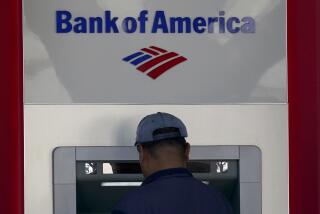BofA to Reimburse Nations Investors
- Share via
Bank of America Corp., accused by New York Atty. Gen. Eliot Spitzer of letting a hedge fund engage in improper mutual fund trading, said Monday that it planned to reimburse investors who lost money from the transactions.
The Charlotte, N.C.-based bank said an independent review would be conducted to determine how much the trading by Canary Capital Partners cost shareholders of BofA’s Nations Funds.
The bank also said it would return to the funds all fees generated by the trading.
BofA follows Janus Capital Group Inc. in saying it would pay restitution to investors amid illegal-trading probes by Spitzer, the Securities and Exchange Commission and other regulators.
BlackRock Inc. and Federated Investors Inc., two of the largest U.S. bond fund managers, said Monday that they got subpoenas from Spitzer seeking information.
Pacific Investment Management Co. of Newport Beach also has been contacted by authorities in the widening investigation.
The bond giant known as Pimco has been contacted “concerning the market timing and late trading practices of mutual funds,” spokesman Mark Porterfield said Monday.
“We intend to cooperate fully with these inquiries,” he added, declining to specify whether the firm had received a formal subpoena or an informal request for information, or which authorities were in contact with the firm.
Pimco, which has $130 billion in stock and bond fund assets, is the nation’s sixth-largest mutual fund company, according to data tracker Financial Research Corp.
Two Los Angeles-based fund companies, American Funds and TCW Galileo Funds, said they had not been contacted by Spitzer’s office, the SEC or the Justice Department.
“Almost every organization that has been named wants to assure its investors as well as the marketplace that they’re doing everything they can to find out any issues that are accurate and relevant,” said Geoff Bobroff, an industry consultant in East Greenwich, R.I.
Also Monday, Spitzer’s office said the U.S. prosecutor in Manhattan, James Comey, had contacted the attorney general about joining the investigation. Involvement by the U.S. attorney’s office increases the pressure on the managers of mutual funds and hedge funds being probed because it carries the threat of federal criminal charges.
Marvin Smilon, a spokesman for the U.S. attorney’s office for New York’s southern district, had no comment.
Canary Capital Partners, a New Jersey-based hedge fund managed by Edward Stern, agreed last week to return $30 million in profit and pay a $10-million fine stemming from improper trading in mutual funds through Bank of America, Bank One Corp., Janus Capital and Strong Capital Management Inc.
Spitzer said the four companies let Canary Capital trade shares after the market closed and engage in short-term market timing in exchange for “millions” in additional revenue.
Canary did its “most extensive late trading and timing” with BofA, Spitzer’s complaint said.
The bank extended about $300 million of credit to finance the trading, and Canary had $16.8 million invested in four of the bank’s funds, Spitzer said.
Bank of America’s independent review will be done by a consultant and will focus on “the issues related to late-day trading activities in Nations Funds,” the bank said.
Chief Executive Kenneth Lewis on Friday said employees who let Canary buy fund shares at prices not available to most investors would be held accountable.
“Does this mean people will lose jobs? Maybe,” Bobroff said. “Does this mean money will have to be reimbursed to funds? Probably.”
Shares of BofA, the nation’s third-largest bank by assets, rose 83 cents to $76.98 in New York Stock Exchange trading Monday after falling 4% in the three previous days.
Other fund companies receiving subpoenas from Spitzer include Vanguard Group and Putnam Investments.
Janus, the second-biggest publicly traded U.S. mutual fund manager, said Friday that it would reimburse shareholders who lost money because of market-timing trades.
More to Read
Inside the business of entertainment
The Wide Shot brings you news, analysis and insights on everything from streaming wars to production — and what it all means for the future.
You may occasionally receive promotional content from the Los Angeles Times.










